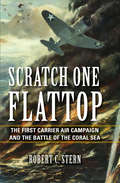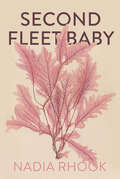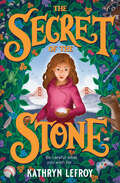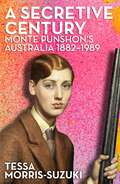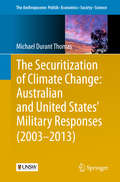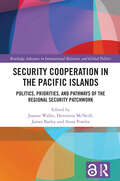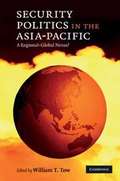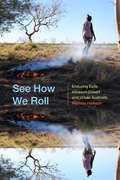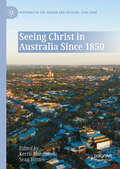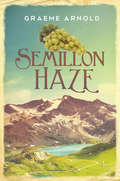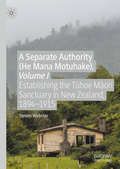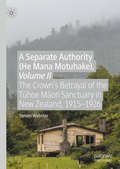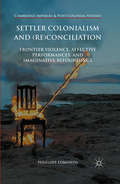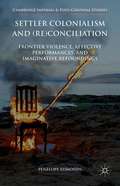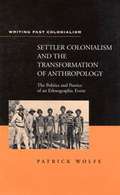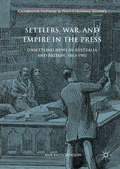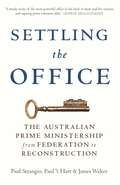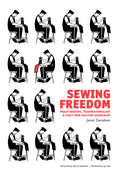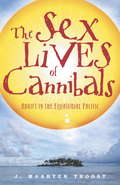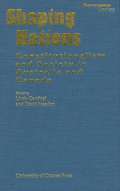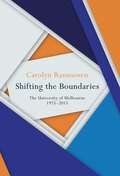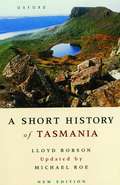- Table View
- List View
Scratch One Flattop: The First Carrier Air Campaign and the Battle of the Coral Sea (Twentieth-century Battles Ser.)
by Robert C. SternA study of the historic World War II naval battle, the first involving aircraft carriers and first in which neither warship was in sight of the other.By the beginning of May 1942, five months after the Pearl Harbor attack, the US Navy was ready to challenge the Japanese moves in the South Pacific. When the Japanese sent troops to New Guinea and the Solomon Islands, the Americans sent the carriers Lexington and Yorktown to counter the move, setting the stage for the Battle of the Coral Sea . . . In this book,historian Robert C. Stern analyzes the Battle of the Coral Sea, the first major fleet engagement where the warships were never in sight of each other. Unlike the Battle of Midway, the Battle of the Coral Sea has received remarkably little study. Stern covers not only the action of the ships and their air groups but also describes the impact of this pivotal engagement. His analysis looks at the short-term impact as well as the long-term implications, including the installation of inert gas fuel-system purging on all American aircraft carriers and the push to integrate sensor systems with fighter direction to better protect against enemy aircraft.The essential text on the first carrier air campaign, Scratch One Flattop is a landmark study on an overlooked battle in the first months of the United States’ engagement in World War II.“His research into sources on both sides is exhaustive and he has used Japanese translators where necessary and appropriate to best illuminate materials. His effort has taken years of meticulous scholarship and it shows. . . . Highly recommended.” —Lisle A. Rose, The Northern Mariner / Le marin du nord
Second Fleet Baby
by Nadia RhookSecond Fleet Baby examines birth and motherhood, drawing on the playful energies and powers of 18th and 19th century ‘convict chicks', including Rhook's own ancestor, who was transported from England to Eora land on the Lady Juliana as part of the notorious 1789 Second Fleet.How might a settler reconcile the violence bound up with their role populating stolen land with the love and euphoria that can flow from parenthood? Intergenerational ties are traced through the soft weapons of the body, connecting the intimacies of nation-making with the politics of reproduction in lavishly personal ways.
The Second Son (The Novaks #1)
by Loraine PeckDuty always has a price. When Ivan Novak is shot dead putting out his garbage bins in Sydney’s west, his family wants revenge, especially his father Milan, a notorious crime boss. It’s a job for the second son, Ivan’s younger brother Johnny. But Johnny loves his wife Amy and their son Sasha. And she’s about to deliver her ultimatum: either the three of them escape this wave of killing or she’ll leave, taking Sasha. Torn between loyalty to his family and love for his wife, Johnny plans the heist of a lifetime and takes a huge risk. Is he prepared to pay the price? And what choice will Amy make? The Second Son is a brilliant action-packed crime debut that creates a world where honour is everything, violence is its own language, and love means breaking all the rules.
The Secret of the Stone
by Kathryn LefroyWhen Olive and her friends find a mysterious stone and discover it grants wishes, they think their lives are made. Sure, they' re going to save the world and all that stuff, but there are a few fun things they want to do first.Then they realise other people are looking for the stone. People who will stop at nothing to get it ... As the stakes become more dangerous, secrets are kept, loyalties are questioned, and promises are broken. How much are Olive and her friends willing to risk to make all their dreams come true?
Secretive Century: Monte Punshon's Australia
by Tessa Morris-SuzukiMonte grew up in a secretive century. She lived in a society where appearances mattered, and keeping them up often involved creating silence around ancestral origins, painful memories and personal desires. Monte Punshon refused to be labelled. She was, at various times, Ethel May Punshon, Miss Montague, Monte, Mickey and Erica Morley Punshon, moving effortlessly from the Methodist respectability of bourgeois Ballarat to the bohemian world of children's travelling theatre, from patriotic amateur acting to pioneering radio work, from a dear old lady with perfect nineteenth-century diction to the bad girl who frequented edgy Melbourne bars, playing a lively part in the secret drag parties of 1930s queer Melbourne. There were social as well as personal reasons for her concealment. In a life that spanned more than a century - 1882 to 1989 - Monte Punshon witnessed crucial events in Australia's history, and her story shines a light on the hidden corners and complexities of late nineteenth- and twentieth-century society. In this imaginative biography, Tessa Morris-Suzuki brings to life a woman who was unafraid to be, and who accepted, willingly, the price of her liberation.
The Securitization of Climate Change: Australian and United States' Military Responses (2003 - #2013)
by Michael Durant ThomasThis book examines the process of climate securitization within the United States and Australian political-military sector between 2003 - 2013. Drawing on established securitization frameworks ("Copenhagen" and "Paris" Schools), the author uses a combination of qualitative and quantitative techniques to systematically analyze more than 3,500 official publications from the US and Australian political-military sector. The results offers a rare insight into how each military framed climate change as a security threat and formulated their own unique institutional responses within a heavily politicized context. The book consists of eight chapters divided into four parts; focusing on: perspectives/methodological insights; empirical case studies; case study comparison and concluding observations.
Security Cooperation in the Pacific Islands: Politics, Priorities, and Pathways of the Regional Security Patchwork (Routledge Advances in International Relations and Global Politics)
by Joanne Wallis Henrietta McNeill James Batley Anna PowlesWallis, McNeill, Batley, Powles and the contributors examine the dynamics of Pacific Islands’ security cooperation, analysing how it helps address regional security challenges amid the broader strategic competition between China and the United States that is increasingly playing out in the region.Pacific Island countries do not want to become pawns in this competition, but its impacts are inescapable and are creating additional security challenges. Compounding these effects are climate change and COVID-19, both of which have intersected with existing traditional and non-traditional security challenges facing the region. In response, Pacific Island leaders have vowed to pursue greater security cooperation amongst themselves and with partner states. This book addresses partner states’ interests in the region, how these interests and Pacific priorities align, and if not, what the possible consequences may be. It also analyses successful areas of security cooperation and tackles how challenges may be improved.Incorporating a range of perspectives from key leaders, practitioners and scholars, this is an empirically grounded analysis of security cooperation within the Pacific Islands region and by the region’s major partners. A vital resource for researchers and practitioners seeking to better understand Pacific Islands’ security collaboration and the inherent challenges it faces.The Open Access version of this book, available at http://www.taylorfrancis.com, has been made available under a Creative Commons Attribution-Non Commercial-No Derivatives (CC-BY-NC-ND) 4.0 license.
Security Politics in the Asia-Pacific: A Regional-Global Nexus?
by William T. TowAsia is experiencing major changes in its security relations. This book brings together respected experts to assess both the theoretical and empirical dimensions of the Asian security debate. Building on the latest research on Asia's regional security politics, it focuses on the 'regional-global nexus' as a way to understand the dynamics of Asian security politics and its intersection with global security. Contributors to the volume offer diverse but complementary perspectives on which issues and factors are most important in explaining how security politics in Asia can be interpreted at both the regional and global levels of analysis. Issues addressed include power balancing and alliances, governance and democracy, maritime and energy security, the relationship between economics and security, 'human security', terrorism, nuclear non-proliferation, climate change and pandemics. This work will serve as a standard reference on the evolution of key issues in Asian security.
See How We Roll: Enduring Exile between Desert and Urban Australia (Global Insecurities)
by Melinda HinksonIn See How We Roll Melinda Hinkson follows the experiences of Nungarrayi, a Warlpiri woman from the Central Australian desert, as she struggles to establish a new life for herself in the city of Adelaide. Banished from her hometown, Nungarrayi energetically navigates promises of transformation as well as sedimented racialized expectations on the urban streets. Drawing on a decades-long friendship, Hinkson explores these circumstances through Nungarrayi's relationships: those between her country and kin that sustain and confound life beyond the desert, those that regulate her marginalized citizenship, and the new friendships called out by displacement and metropolitan life. An intimate ethnography, See How We Roll provides great insight into the enduring violence of the settler colonial state while illuminating the efforts of Indigenous people to create lives of dignity and shared purpose in the face of turbulence, grief, and tightening governmental controls.
Seeing Christ in Australia Since 1850 (Histories of the Sacred and Secular, 1700–2000)
by Kerrie Handasyde Sean WinterThis book presents cultural representations of Christ embedded in the imagination and the contested myths of Australian life. The essays attest to the variety and subtlety of neglected or unspoken representations of Christ in Australia. In a land that has often declared itself secular or post-Christian, this volume looks into the Australian imagination, in between the sacred and secular, to see Christ in Australia.
Semillon Haze
by Graeme ArnoldAustinn Baeder arrived in the Port of Geelong in 1845 with his two adult sons to start a new life. The Swiss winemaker planned to open a new vineyard and winery on the banks of the Barwon River. The retired soldier came looking for new opportunities, but to also leave a troubled past behind. Mitchell Baeder, a modern-day descendant of Austinn continues the winemaking tradition on the original property Austinn and his sons established, Cressier. Mitchell is a bit old-fashioned and slow to embrace modern techniques. His son, Adam is a wayward adolescent, and causes Mitchell and his wife Fiona much grief. Adam's on and off relationship with Jenny, a girl from the adjacent winery, has the potential to bring the family together. A series of unfortunate events unwittingly brings the modern day Baeder family far closer to their ancestors than they could ever imagine. It could even expose a dreadful family secret that lay dormant for over 100 years: the true reason behind Austinn's emigration.
A Separate Authority (He Mana Motuhake), Volume I: Establishing the Tūhoe Māori Sanctuary in New Zealand, 1894–1915
by Steven WebsterThis book is an ethnohistorical reconstruction of the establishment in New Zealand of a rare case of Maori home-rule over their traditional domain, backed by a special statute and investigated by a Crown commission the majority of whom were Tūhoe leaders. However, by 1913 Tūhoe home-rule over this vast domain was being subverted by the Crown, which by 1926 had obtained three-quarters of their reserve. By the 1950s this vast area had become the rugged Urewera National Park, isolating over 200 small blocks retained by stubborn Tūhoe "non-sellers". After a century of resistance, in 2014 the Tūhoe finally regained statutory control over their ancestral domain and a detailed apology from the Crown.
A Separate Authority (He Mana Motuhake), Volume II: The Crown’s Betrayal of the Tūhoe Māori Sanctuary in New Zealand, 1915–1926
by Steven WebsterFollowing on from Volume I on the formation of the Urewera District Native Reserve, this monograph examines the period from 1908 to 1926, during which time the Crown subverted Tūhoe control of the UDNR, established a mere decade earlier. While Volume I described how the Tūhoe were able to deploy kin-based power to manipulate Crown power as well as confront one another, this volume describes ways in which the same ancestral descent groups closed ranks to survive nearly two decades of predatory Crown policies determined to dismantle their sanctuary. A relentless Crown campaign to purchase individual Tūhoe land shares ultimately resulted in a misleading Crown scheme to consolidate and relocate Tūhoe land shares, thereby freeing up land for the settlement of non- Tūhoe farmers. By the 1950s, over 200 small Tūhoe blocks were scattered throughout one of the largest National Parks in New Zealand. Although greatly weakened by these policies in terms of kinship solidarity as well as land and other resources, Tūhoe resistance continued until the return of the entire park in 2014—with unreserved apologies and promises of future support. In both volumes of A Separate Authority (He Mana Motuhake), Webster takes the stance of an ethnohistorian: he not only examines the various ways control over the Urewera District Native Reserve (UDNR) was negotiated, subverted or betrayed, and renegotiated during this time period, but also focuses on the role of Māori hapū, ancestral descent groups and their leaders, including the political economic influence of extensive marriage alliances between them. The ethnohistorical approach developed here may be useful to other studies of governance, indigenous resistance, and reform, whether in New Zealand or elsewhere.
Settler Colonialism and: Frontier Violence, Affective Performances, and Imaginative Refoundings (Cambridge Imperial and Post-Colonial Studies Series)
by Penelope EdmondsThis book examines the performative life reconciliation and its discontents in settler societies. It explores the refoundings of the settler state and reimaginings of its alternatives, as well as the way the past is mobilized and reworked in the name of social transformation within a new global paradigm of reconciliation and the 'age of apology'.
Settler Colonialism and: Frontier Violence, Affective Performances, and Imaginative Refoundings (Cambridge Imperial and Post-Colonial Studies)
by Penelope EdmondsThis book examines the performative life reconciliation and its discontents in settler societies. It explores the refoundings of the settler state and reimaginings of its alternatives, as well as the way the past is mobilized and reworked in the name of social transformation within a new global paradigm of reconciliation and the 'age of apology'.
Settler Colonialism And The Transformation Of Anthropology: The Politics And Poetics Of An Ethnographic Event (Writing Past Colonialism)
by Patrick WolfeThis work analyzes the politics of anthropological knowledge from critical perspective that alters existing understandings of colonialism. At the same time, it produces insights into the history of anthropology. Organized around an historical reconstruction of the great anthropological controversy over doctrines of virgin birth, the book argues that the allegation a great deal about European colonial discourse and little if anything about indigenous beliefs. By means of an Australian example, the book shows not only that the alleged ignorance was an artifact of the anthropological theory that produced it, but also that the anthropology was an artifact of the anthropological theory that produced it, but also that the anthropology concerned has been closely tied into both the historical dispossession and the continuing oppression of native peoples. The author explores the links between metropolitan anthropological theory and local colonial politics from the 19th century up to the present, settler colonialism, and the ideological and sexual regimes that characterize it.
Settlers, War, and Empire in the Press
by Sam HutchinsonThis book explores how public commentary framed Australian involvement in the Waikato War (1863-64), the Sudan crisis (1885), and the South African War (1899-1902), a succession of conflicts that reverberated around the British Empire and which the newspaper press reported at length. It reconstructs the ways these conflicts were understood and reflected in the colonial and British press, and how commentators responded to the shifting circumstances that shaped the mood of their coverage. Studying each conflict in turn, the book explores the expressions of feeling that arose within and between the Australian colonies and Britain. It argues that settler and imperial narratives required constant defending and maintaining. This process led to tensions between Britain and the colonies, and also to vivid displays of mutual affection. The book examines how war narratives merged with ideas of territorial ownership and productivity, racial anxieties, self-governance, and foundational violence. In doing so it draws out the rationales and emotions that both fortified and unsettled settler societies.
Settling the Office: The Australian Prime Ministership from Federation to Reconstruction
by Paul Strangio Paul 't Hart James WalterThe prime ministership is indisputably the most closely observed and keenly contested office in Australia. How did it grow to become the pivot of national political power? Settling the Office chronicles the development of the prime ministership from its rudimentary early days following Federation through to the powerful, institutionalised prime-ministerial leadership of the postwar era.
Sewing Freedom
by Barry Pateman Jared DavidsonSewing Freedom is the first in-depth study of anarchism in New Zealand during the turbulent years of the early 20th century-a time of wildcat strikes, industrial warfare, and a radical working class counter-culture. Interweaving biography, cultural history, and an array of archival sources, this engaging account unravels the anarchist-cum-bomber stereotype by piecing together the life of Philip Josephs-a Latvian-born Jewish tailor, antimilitarist, and founder of the Wellington Freedom Group. Anarchists like Josephs not only existed in the 'Workingman's Paradise' that was New Zealand, but were a lively part of its labour movement and the class struggle that swept through the country, imparting uncredited influence and ideas. Sewing Freedom places this neglected movement within the global anarchist upsurge, and unearths the colourful activities of New Zealand's most radical advocates for social and economic change. Includes illustrations by Icky from Justseeds and a foreword by Barry Pateman (Kate Sharpley Library Archivist and Associate Editor at the Emma Goldman Papers)."Davidson has produced much more than a soundly researched and very engaging biography... this is an excellent, wide-ranging contribution to our knowledge of the international (and indeed transnational) anarchist movement, and sweeps us along in a fascinating story that takes us from the pogroms in Russian Latvia, to the working-class slums of Victorian Glasgow, to the early struggles of the nascent labour movement in New Zealand."-Dr David Berry, author of A History of the French Anarchist Movement"Many millions of words have been written on New Zealand history. The labour movement does not feature prominently in this vast corpus; in fact, quite the contrary. And within this relatively sparse coverage, anarchism is almost invariably assigned at best a passing mention. We must be grateful for Davidson's determination to restore an anarchist voice to the history of the outermost reach of the British Empire."-Dr Richard Hill, Professor of New Zealand Studies & author of Iron Hand in the Velvet Glove"A ground breaking tale of a rebel life, skillfully unearthed by Jared Davidson. A must read."-Lucien van der Walt, co-author of Black Flame
The Sex Lives of Cannibals: Adrift in the Equatorial Pacific
by J. Maarten TroostFantasized about quitting the 9-5? Walking away from credit card debt and student loans? Think living in the South Pacific for two years sounds like a perfect solution and perhaps even a winning idea for your first novel? Maarten Troost does just that, setting up as a devil-may-care islander while his girlfriend, Sylvia, gets to work on saving the planet, or at least a little part of it on an end-of-the-world atoll, Tarawa. Life on Tarawa resembles not so much paradise as a theatre of the absurd where planes fly with the aid of masking tape, Coconut Stalinism prevails as national government and Sylvia is co-opted by the CIA to spy on the Chinese. But abandoning continental hang-ups like barbequeing the local dogs and watching on as international industrial fishing trawlers plunder the world's richest tuna supply aren't so easy.
Shaping Nations: Constitutionalism and Society in Australia and Canada
by Linda Cardinal David HeadonShaping Nations brings together the work of Australian and Canadian scholars around five core themes: constitutionalism, colonialism, republicanism, national identity, and governance.
Shifting the Boundaries: The University of Melbourne 1975-2015
by Carolyn RasmussenThe University of Melbourne was already over 110 years old when this history begins. The second oldest university in Australia, it has been graced with a number of histories written by eminent historians. Each of these histories has documented the University's evolution and diversification from the perspective of their time. Shifting the Boundaries: The University of Melbourne 1975-2015 continues that story, but the period covered is entirely within living memory. It pauses at ten-year intervals, the first at 1975, to look back at the previous decade. We are invited to enter the University of Melbourne as a living institution, and to watch it as it responds to changing expectations of students, staff and community, to shifting policy frameworks and to an evolving economic and social context. The principal themes that arc across this story involve massive growth, the evolution towards a research-intensive institution, changing pedagogical imperatives, bureaucratisation and internationalisation in the face of declining public funding.
A Short History of Tasmania
by Lloyd L. Robson Michael RoeThis is a concise and lively history of Tasmania from its earliest times to the late 1990s. It is also a case study of British colonization in Australia, tracing the rocky path from invasion to modernity, from the rigors of Van Dieman's Land to the Franklin Dam controversy. For this new edition, Michael Roe has added two new chapters which provide a history up to 1996.
